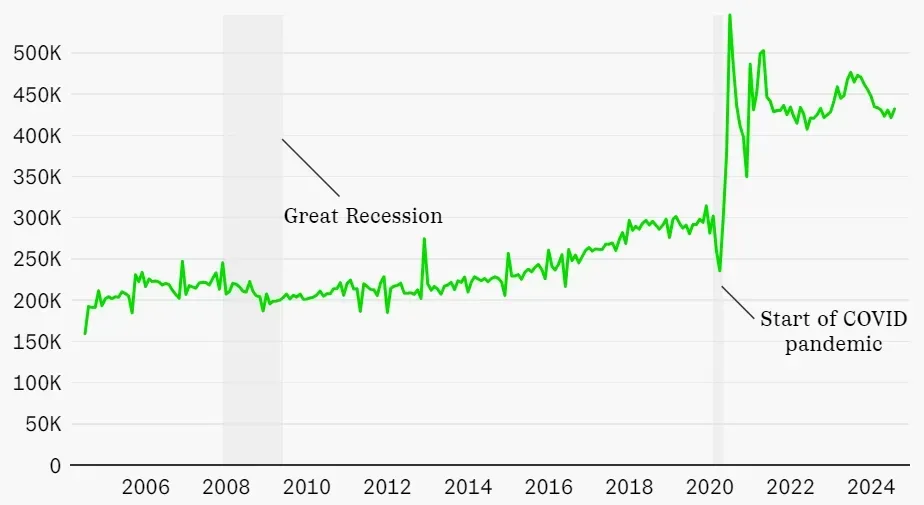The Rise of Startups and What That Means for Franchising in 2025
In recent years, the entrepreneurial landscape has witnessed unprecedented growth, with record numbers of startups emerging globally. This surge has significant implications for various sectors, especially franchising, which must adapt to address emerging challenges and capitalise on new opportunities.
The Startup Boom: An Overview
The Post-Pandemic Boom is Continuing in the US

Source: Why More Americans Than Ever Are Starting Small Businesses from data provided by the Federal Reserve Bank of Saint Louis
The pandemic years saw a dramatic increase in business formations. In 2021 alone, over 5.4 million new business applications were filed in the United States, marking a 20% increase from the previous year. And the trend was not isolated to the US — around the world, countries saw similar spikes in entrepreneurship.
In 2024, while the growth has slowed somewhat, new business numbers are still at historic highs.
What has fuelled this growth?
Remote Work Flexibility: The rise of remote work has lowered entry barriers, allowing more individuals to launch startups without the overhead of physical offices.
Technological Advancements: Innovations in technology have made it easier and more cost-effective to start businesses, particularly in e-commerce, software development and digital services.
Shift in Consumer Behaviour: The pandemic shifted consumer preferences toward online shopping and digital services, creating opportunities for startups that cater to these trends.
Rising Unemployment Rates: After hitting record lows in many countries, unemployment is on the rise again, prompting many of those laid off to start their own businesses.
The Impact on Franchising
As the number of startups continues to rise, franchising is experiencing new opportunities as well as challenges:
1. Increased Competition
With more startups entering the market, franchisors face greater competition. This forces existing franchises to innovate and differentiate themselves, whether through improved customer service, unique offerings or enhanced branding strategies. For example, established brands may need to adopt more flexible business models or expand their product lines to stay relevant.
2. Emergence of New Franchise Concepts
The startup boom has led to the creation of novel business models that can be franchised. Concepts that were once the domain of solo entrepreneurs, such as food trucks or mobile services, are now being structured as franchises. This diversification expands the range of options available to potential franchisees, allowing them to choose from innovative and trendy concepts that resonate with today’s consumers.
3. Access to Funding and Resources
With the influx of startups, there is also an increase in available funding sources. Venture capital, angel investors and crowdfunding platforms are now more accessible, enabling aspiring franchisees to secure the necessary capital to start their businesses. Franchisors can also benefit from this trend, as many are increasingly looking for franchisees who can bring new ideas and local insights to the table.
4. Focus on Technology and Digital Solutions
Startups are often at the forefront of technological adoption, and their influence is pushing franchisors to embrace digital solutions. This includes the implementation of advanced point-of-sale systems, online ordering platforms and customer engagement tools. Franchises that integrate technology effectively can improve efficiency and enhance the customer experience, staying competitive in a rapidly evolving market.
5. Changing Franchisee Profiles
The profile of franchisees is also changing. With more entrepreneurs drawn to franchising, the demographic is becoming younger and more diverse. This shift brings fresh perspectives and a willingness to experiment with new strategies, which can benefit franchisors looking to innovate and stay relevant.
Keeping ahead of the competition
While the rise in startups presents many opportunities for franchising, it also poses challenges. Franchisors must navigate a landscape where competition is fierce, and consumer expectations are high. The influx of new businesses can lead to market saturation in certain sectors, making it essential for franchisors to conduct thorough market research and develop robust support systems for franchisees.
The record numbers of startups are reshaping the franchising landscape, introducing both opportunities and challenges. As the market evolves, franchisors must adapt to stay competitive, leveraging technology and innovation while responding to the shifting dynamics of consumer behaviour.

The Ultimate Business Model Canvas for Franchisors ebook
Now there’s a game-changing new strategic tool to help you to:
- revitalise your Business Model
- enhance your competitive edge
- explore new opportunities in your markets
- implement change in your franchise network
My new e-book will show you how. Download it for free.
ARRANGE YOUR
FREE
CONSULTATION

That’s me on the right. I worked with this client to reinvent their franchise and business models and today they’re the biggest home-grown brand in their industry. Could I do the same for you? Contact me to arrange a free confidential strategy consultation.
Share on your Page:
Follow us:














